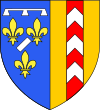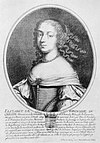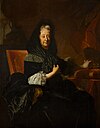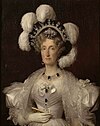Duke of Nemours
Duke of Nemours was a title in the Peerage of France. The name refers to Nemours in the Île-de-France region of north-central France.
History
[edit]In the 12th and 13th centuries, the Lordship of Nemours, in the Gatinais, France, was a possession of the house of Villebéon, a member of which, Gautier, was marshal of France in the middle of the 13th century. The lordship was sold to King Philip III of France in 1274 and 1276 by Jean and Philippe de Nemours. It was then made a county and given in 1364 to Jean III de Grailly, captal de Buch.
In 1404, Charles VI of France gave it to Charles III of Navarre and elevated it into a duchy in the peerage of France, in exchange to his ancestral county of Évreux in Normandy.
After being confiscated and restored several times, the duchy reverted to the French crown in 1504, after the extinction of the house of Armagnac-Pardiac. In 1507, it was given by Louis XII of France to his nephew, Gaston de Foix, who was killed at the Battle of Ravenna in 1512.
The duchy then returned to the royal domain and was detached from it successively for Giuliano de Medici and his wife Philiberta of Savoy in 1515, for Louise of Savoy in 1524, and for Philip of Savoy, Count of Genevois, in 1528. The descendants of Philip of Savoy held the duchy until its sale to Louis XIV of France.
In 1672, Louis XIV gave it to his brother Philippe de France, Duke of Orléans, whose descendants held it until the French Revolution. It was one of the many subsidiary titles held by the House of Orléans. The title of Duke of Nemours was afterwards given to Louis Charles d'Orléans, the second son of King Louis Philippe of the French.[1]
List of lords
[edit]- House of Château-Landon
- Orson (1120–1148)
- Aveline (1148–1174), died 1196
Aveline married Walter of Villebéon, lord of Beaumont-du-Gâtinais, in 1150 and shared the lordship with him. They left it to their son in 1174.
- House of Villebéon
- Walter I [Gautier I] (1150–1174), died 1205
- Philip I [Philippe I] (1174–1191)
- Walter II [Gautier II] (1191–1222)
- Philip II [Philippe II] (1222–1255)
- Walter III [Gautier III] (1255–1270)
- Philip III [Philippe III] (1270–1274)
The lordship was sold to the king in 1274.
List of dukes
[edit]House of Evreux (1404–1504)
[edit]- Charles d'Évreux (1361–1425), also King Charles III of Navarre
After the death of Charles III in 1425, the Duchy was claimed by the descendants of both his younger daughter, Beatrice, and his elder daughter and heiress, Blanche I of Navarre. Louis XI settled the claim on Jacques d'Armagnac, grandson of Beatrice, in 1462, though Blanche's descendants, the Kings of Navarre, claimed the title until 1571.
- Eléanore de Bourbon (1425–c.1462)
- Jacques d'Armagnac (1462–1477)
- confiscated from Jacques at his execution for treason in 1477, restored to his son Jean in 1484
- Jean d'Armagnac (1484–1500)
- Louis d'Armagnac (1500–1503)
- Marguerite d'Armagnac (1503)
- Charlotte d'Armagnac (1503–1504)
- The last descendant of Béatrix d'Évreux, she died without issue.
House of Foix (1507–1512)
[edit]- Gaston of Foix (1507–1512)
House of Medici (1515–1524)
[edit]- Giuliano de' Medici (1515–1516), married to:
- Philiberte of Savoy (1516–1524)
House of Savoy (1524–1672)
[edit]- Louise of Savoy (1524–1531), Duchess of Angoulême, Francis I of France's mother.
She received the duchy of Nemours in 1524 with the duchy of Anjou. It was later transferred to her half-brother in 1528 and she received the duchy of Touraine in exchange.[2][3] She also received later the Duchy of Auvergne.
- Philippe of Savoy (1528–1533)
- Jacques of Savoy (1531–1585)
- Charles Emmanuel of Savoy (1567–1595)
- Henri I of Savoy (1572–1632)
- Louis I of Savoy (1615–1641)
- Charles Amadeus of Savoy (1624–1652)
- Henri II of Savoy (1625–1659)
House of Orléans (1672–1848)
[edit]- Philippe de France (1640–1701)
- Philippe d'Orléans (1674–1723), Regent of France 1715–1723, son of the above
- Louis d'Orléans, Duke of Orléans (1703–1752), son of the above
- Louis Philippe d'Orléans (1725–1785), son of the above
- Philippe d'Orléans, Philippe Égalité (1747–1793), son of the above
- Louis Philippe d'Orléans (1773–1850), King of the French, 1830–1848, son of the above
Titular Dukes of the House of Orléans
[edit]- Louis Charles d'Orléans (1850–1896), son of the above
- Charles Philippe d'Orléans (1905–1970), great-grandson of the above
Potential claimants of the House of Orléans-Braganza
[edit]In 1909, members of the House of Orléans and the House of Orléans-Braganza signed the Pact of Brussels (also known as the Declaration of Brussels), the Duke of Orléans being present. The dynastic pact created the title of Prince of Orléans-Braganza for the Count d'Eu and his descendants, thus maintaining the princely status of his house, although this is considered a house distinct from the Royal House of France, and the Count d'Eu did not in fact recover his former position in the line of Orleans succession to the French throne.[4]
Under the Pact of Brussels the Count d'Eu and his sons equally undertook in his name and the name of his descendants not to contest in any way to the branch of the Duke d'Alençon the possession of the title of Duke of Nemours.[5][6]
Nevertheless, Charles Philippe d'Orléans, the last Duke of Nemours and only descendant of the Alençon, died without heirs. His death opened the theoretical possibility for the Head of the House of Orléans-Braganza to claim said title without violating the family pact.
List of duchesses
[edit]This is a list of duchesses of Nemours and their original houses.
House of Évreux
[edit]| Picture | Name | Father | Birth | Marriage | Became Duchess | Ceased to be Duchess | Death | Spouse |
|---|---|---|---|---|---|---|---|---|

|
Eleanor of Castile | Henry II of Castile (Trastamara) |
circa 1363 | 1375 | 27 February 1416 | Charles III of Navarre | ||

|
Louise d'Anjou | Charles, Count of Maine (Anjou) |
1445 | 1462 | 1477 | Jacques, Duke of Nemours | ||

|
Yolande de La Haye | (La Haye) | unknown | 24 April 1492 | 1500 | 1517 | Jean, Duke of Nemours | |
| Picture | Name | Father | Birth | Marriage | Became Duchess | Ceased to be Duchess | Death | Spouse |
House of Medici
[edit]| Picture | Name | Father | Birth | Marriage | Became Duchess | Ceased to be Duchess | Death | Spouse |
|---|---|---|---|---|---|---|---|---|

|
Philiberta of Savoy | Philip II, Duke of Savoy (Savoy) |
1498 | 25 January 1515 | 4 April 1524 | Giuliano de' Medici | ||
| Picture | Name | Father | Birth | Marriage | Became Duchess | Ceased to be Duchess | Death | Spouse |
House of Savoy
[edit]| Picture | Name | Father | Birth | Marriage | Became Duchess | Ceased to be Duchess | Death | Spouse |
|---|---|---|---|---|---|---|---|---|

|
Charlotte d'Orléans | Louis, Duke of Longueville (Orléans) |
1 November 1512 | 8 September 1549 | 25 November 1533 | 8 September 1549 | Philippe | |

|
Anna d'Este | Ercole II, Duke of Ferrara (Este) |
16 November 1531 | 29 April 1566 | 15 June 1585 | 15 May 1607 | Jacques | |

|
Anne of Lorraine | Charles, Duke of Aumale (Lorraine) |
1600 | 18 April 1618 | 10 July 1632 | 10 February 1638 | Henri I | |

|
Élisabeth de Bourbon | César, Duke of Vendôme (Bourbon) |
August 1614 | 11 July 1643 | 30 July 1652 | 19 May 1664 | Charles Amadeus | |

|
Marie d'Orléans | Henri II, Duke of Longueville (Orléans) |
5 March 1625 | 22 May 1657 | 14 January 1659 | 16 June 1707 | Henri II | |
| Picture | Name | Father | Birth | Marriage | Became Duchess | Ceased to be Duchess | Death | Spouse |
House of Orléans
[edit]| Picture | Name | Father | Birth | Marriage | Became Duchess | Ceased to be Duchess | Death | Spouse |
|---|---|---|---|---|---|---|---|---|

|
Elizabeth Charlotte of the Palatinate | Charles I Louis, Elector Palatine (Palatinate) |
27 May 1652 | 16 November 1671 | 1672 peerage awarded to husband |
9 June 1701 husband's death |
9 December 1722 | Philippe, Duke of Orléans |

|
Françoise Marie de Bourbon, Légitimée de France | Louis XIV of France (Bourbon (Illegitimate)) |
25 May 1677 | 18 February 1692 | 9 June 1701 husband's accession |
2 December 1723 husband's death |
1 February 1749 | Philippe, Duke of Orléans |

|
Margravine Johanna of Baden-Baden | Louis William, Margrave of Baden-Baden (Zähringen) |
10 November 1704 | 13 July 1724 | 8 July 1726 | Louis, Duke of Orléans | ||

|
Louise Henriette de Bourbon | Louis Armand, Prince of Conti (Bourbon) |
20 June 1726 | 17 December 1743 | 4 February 1752 husband's accession |
9 February 1759 | Louis Philippe, Duke of Orléans | |

|
Louise Marie Adélaïde de Bourbon | Louis Jean Marie, Duke of Penthièvre (Bourbon) |
13 March 1753 | 8 May 1768 | 18 November 1785 husband's accession |
6 November 1793 husband's execution |
23 June 1821 | Philippe, Duke of Orléans |

|
Maria Amalia of Naples and Sicily | Ferdinand I of the Two Sicilies (Two Sicilies) |
26 April 1782 | 25 November 1809 | 9 August 1830 became Queen consort |
24 March 1866 | Louis Philippe I | |

|
Victoria of Saxe-Coburg and Gotha | Prince Ferdinand of Saxe-Coburg and Gotha (Wettin) |
14 February 1822 | 27 April 1840 | 10 December 1857 | Prince Louis | ||
| Picture | Name | Father | Birth | Marriage | Became Duchess | Ceased to be Duchess | Death | Spouse |
References
[edit]- ^ One or more of the preceding sentences incorporates text from a publication now in the public domain: Chisholm, Hugh, ed. (1911). "Nemours, Lords and Dukes of". Encyclopædia Britannica. Vol. 19 (11th ed.). Cambridge University Press. pp. 369–370.
- ^ Pères Anselme & Ange, Histoire de la Maison Royale de France & des grands officiers, 1728, Tome III, p. 229-232 (Duchy of Touraine).
- ^ Pères Anselme & Ange, Histoire de la Maison Royale de France & des grands officiers, 1728, Tome III, p. 247 (Duchy of Nemours)
- ^ "The 1909 "Pacte de Famille" of the House of Orléans". www.heraldica.org. Retrieved 2022-07-20.
- ^ Montjouvent, Philippe de (1998). Le comte de Paris et sa descendance. Charenton (France): Chaney. pp. 432–35. ISBN 2-913211-00-3. OCLC 43799229.
- ^ Malatian, Teresa Maria (2010). Dom Luís de Orléans e Bragança : peregrino de impérios. São Paulo, SP: Alameda. ISBN 978-85-98325-96-5. OCLC 695282394.
